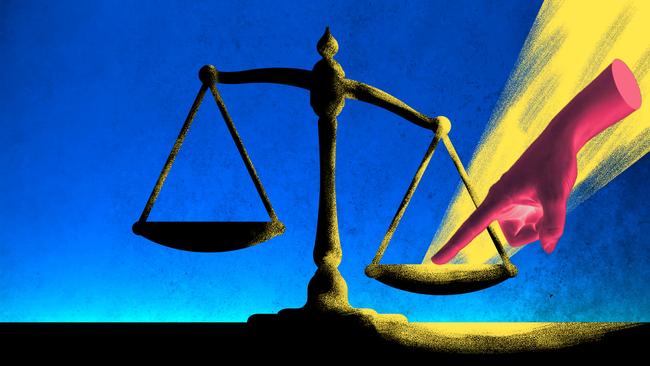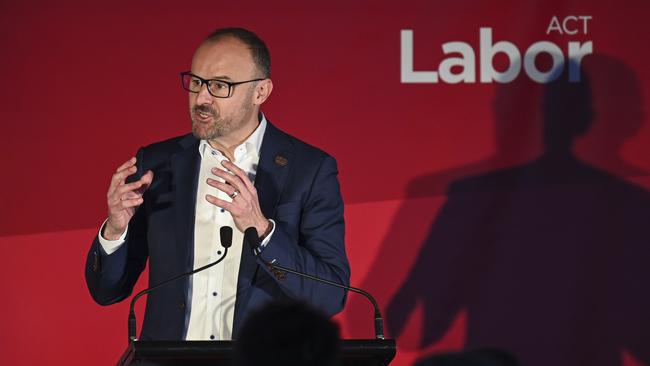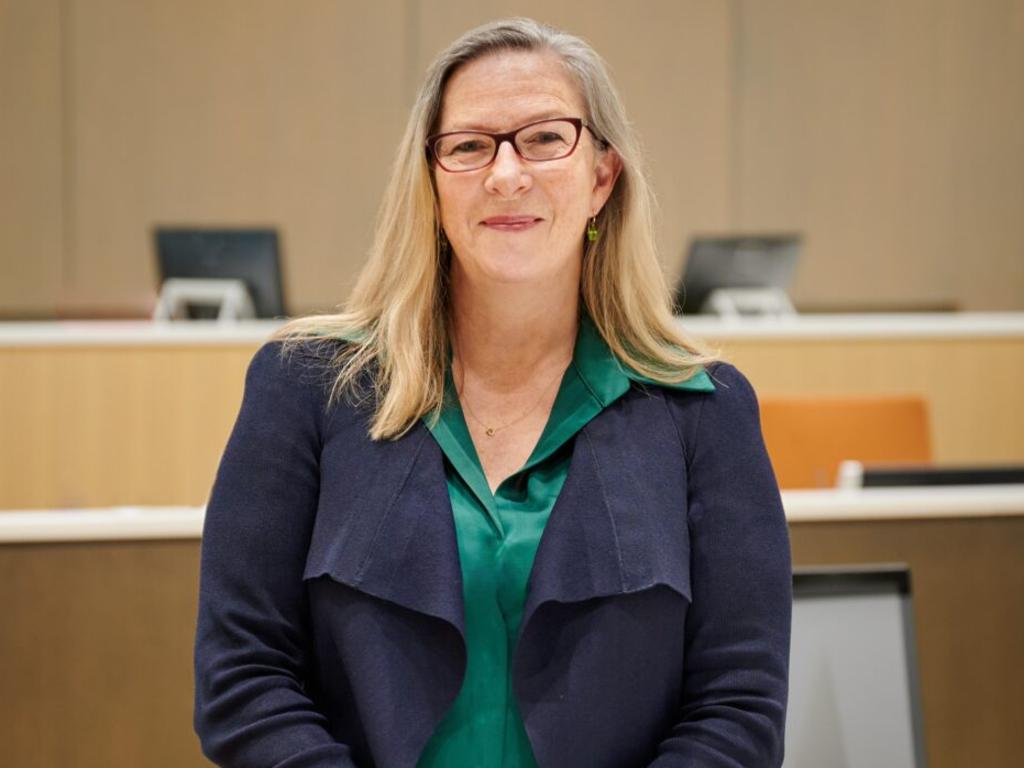The perfect storm for injustice brews in the ACT
The ACT government’s clenched fist is pressing down on one end of Lady Justice’s scales to lift sexual assault conviction rates. And it’s doing this with no apparent evidence that convictions are too low.

Justice problems in the ACT go far deeper than a chief justice appearing to suggest to potential jurors and her subordinate judges that there should be more convictions in sex cases.
But Lucy McCallum’s controversial comments last month were the last straw for some in Canberra’s tight-knit legal profession.
One experienced ACT criminal lawyer, who has acted on the prosecution and defence side of sex trials, points to a perfect storm of injustice brewing in the nation’s capital territory.
Inquirer has discovered that the ACT government’s clenched fist is pressing down on one end of Lady Justice’s scales to lift sexual assault conviction rates. And it’s doing this with no apparent evidence that sexual assault convictions are too low.
Sexual violence is a serious issue across Australia. Moves to reduce sexual violence are important. Equally important is ensuring a fair trial when allegations are contested.
The exertion of state power to secure more convictions is leaving justice in the ACT lopsided. Far from a fair trial being guaranteed, it has become a lottery for an accused facing sex charges.
While McCallum said last month that she wanted to understand why “in the 2020s jurors find it so hard to believe allegations of sexual assault”, many ACT lawyers were in little doubt as to why that was so.
Many contacted Inquirer soon after.
“Unlike most other offence types, sexual assault prosecutions are often the weakest kinds of cases,” the experienced criminal lawyer told Inquirer.
Speaking just days after McCallum’s comments to the Jury Research and Practice Conference, the lawyer said: “As a matter of logic and common sense, one can see why acquittal rates are highest in relation to a ‘he said/she said’ contest.
“Forensic evidence is often of little relevance because in the majority of these trials the issue is not whether the sexual act occurred but whether there was consent.
“This is in contrast to other crime types, such as home invasions or robberies, where forensic evidence can be definitive and plays a greater role, giving a jury more certainty about the accused’s guilt.
“Concerns about low conviction rates for sexual assault matters are misplaced,” the lawyer said, because with an appropriately high burden of proof required when defendants were facing prison it was inevitable that a jury would often find reasonable doubt.
Lawyers who contacted Inquirer did so on condition we did not publish their names. They have careers ahead of them, families to feed, relationships to maintain. They appear regularly in front of the chief justice and other Supreme Court judges.
Are conviction rates low?
The burning issue at the centre of McCallum’s concerns is that conviction rates for contested sexual assault cases in the ACT are low.
Inquirer asked the ACT government for the data to understand if or how the conviction rates had changed in recent years.
Were conviction rates for sex cases falling? Or rising? How did they compare to conviction rates for other serious crimes?
The ACT government provided us with no information. That’s disappointing – we’re not trying to uncover a state secret from a one-party regime. We simply want to report conviction rates to better understand McCallum’s claim that ACT juries are finding it hard to believe complainants who allege sex crimes.

The Australian Bureau of Statistics collects some data about adjudicated court outcomes in sex cases, but Inquirer wanted to know what figures the ACT government was relying on. The territory’s entire multilevel governmental response to sexual assault is based, like McCallum’s statement, on the belief that conviction rates are too low. Indeed, the recently re-elected ACT Labor government, in power for 23 years, has made securing more sex crime convictions a totemic issue.
Government officers should be falling over themselves to reveal the data to justify their sweeping responses. Or are their responses not evidence-based?
The ACT has a population smaller than Blacktown City Council in Sydney’s west. Yet for two weeks Inquirer was told that providing conviction rates for sex crimes was difficult, not to mention the multiple approvals required before the information could be handed over. So the government provided no statistics about sexual assault conviction rates.
It’s worth noting that ABS data does not confirm that conviction rates for sexual assault in the ACT are too low. Take 2021-22: of 29 adjudicated outcomes for sexual assault and related offences, there were 20 guilty pleas, four guilty findings by a jury and prosecutors withdrew five cases. In 2022-33, of the 19 adjudicated outcomes, there were 15 guilty pleas, no guilty findings by a jury and nine cases were withdrawn by prosecutors.
ABS crime statistics make it tricky to compare numbers with, say, 10 years earlier, as guilty pleas and guilty verdicts were at that time folded into one “proven guilty” category. Even so, it’s worth noting that in 2012-13, of the 13 adjudicated outcomes in sex crimes in the ACT, 70 per cent were “proven guilty” – compared with 62 per cent for fraud, deception and related offences.
What’s critical is that the ACT government has refused to provide any conviction rate data for sex crimes to justify its whole-of-government determination to put more people in prison for sex crimes.
The ACT government’s lopsided appetite for justice
Things grew more curious when Inquirer asked the ACT Labor government for information to determine if funding for alleged sex crimes was delivered in a balanced way, addressing both the prosecution and defence sides of contested trials. Had it increased funding to the ACT Office of the Director of Public Prosecutions, to the ACT Victims of Crime Commission, to Legal Aid ACT and Aboriginal Legal Services?
Its funding decisions tell a dismal story of a dangerously ideological government with a lopsided funding approach to justice. While the ACT Labor government is pouring millions of dollars of additional funding into the prosecution of crimes, including sexual assault, its funding of legal aid is leaving defendants with less access to justice.

Put simply, especially when it comes to sex cases, access to justice in the ACT is skewed entirely towards “victim survivors” – as complainants are called in the ACT. If you’re an impoverished defendant charged with sexual assault, your chances of getting a strong defence have diminished significantly in the past decade.
In response to a review of sexual assault prosecutions, the ACT government this year committed increased funding of $3.411m across two years to the Office of the DPP. That money will fund more prosecutors – two extra crown prosecutors and four new crown advocates – which the government says are needed “to support the continued reinvestigations of sexual assault cases identified as requiring possible further action”. The government coughed up another $242,000 to embed a senior prosecutor in the ACT police Sexual Assault and Child Abuse team.
Total additional funding to the ODPP from the ACT Labor government in 2023-24 is $5.8m.
These funding increases to specifically prosecute more sex crimes have a dramatic impact on justice in the ACT, which has a population of under a half-million.
No new funding to defence
Inquirer asked the ACT government whether it had increased funding to legal aid in the territory. (In simple terms, the states and territories fund legal aid for criminal cases while the federal government funds legal aid for family law matters, though in the ACT some crimes are federal ones.)
The ACT government refused to provide an answer.
Never mind. The Legal Aid ACT fees schedules for solicitors and barristers engaged to defend people charged with serious crimes tell their own story of injustice. A comparison of legal aid fees schedules for criminal matters from 2011 to 2023 shows rates for lawyers acting in criminal cases haven’t come close to matching inflation.
For example, a barrister appearing in the ACT Supreme Court for a defendant charged with a sex crime will receive $2210 for trial preparation and for the first day of trial, and $1380 for every additional day.
In 2012, the scheduled fee was $1920 for trial prep and for the first day of trial and $1200 a day thereafter.
That may sound like a lot to a non-lawyer. But a junior criminal barrister in private practice may charge a non-legal aid defendant about $4000 for every day during a sex case trial – and $4000 for every day of trial prep.
The experienced criminal lawyer quoted earlier says the legal aid fee and funding stagnation is “abysmal”.
It’s only logical, says the lawyer, that a big funding boost to the prosecution side should be matched with similar increases to legal aid funding.
“Otherwise, how do you entice senior criminal lawyers to act in these matters? Or perhaps the government has no interest in people charged with sexual offending being able to properly defend themselves to get a fair trial.”
The lawyer says that while the ACT government “waxes lyrical about matters such as Indigenous incarceration rates”, it provides additional funding only for people to be prosecuted and locked up. “It doesn’t provide adequate funding to ensure people get a fair trial or adequate representation in court.”

In contrast to the ACT ODPP receiving $3.4m in additional funding for sex matters alone, Legal Aid ACT has received additional government funding of just $1m for 2024-25 – for all territory criminal matters.
“How do defendants get access to justice?” asks John Boersig, chief executive of Legal Aid ACT.
ACT Bar Association president Brodie Buckland, who rebuked the chief justice for her comments about juries last month, is calling for a thorough investigation into systemic underfunding of legal aid in the ACT.
Buckland told Inquirer the low rates of pay “make it unfeasible for criminal solicitors and barristers to take on legal aid briefs, particularly as they would earn three to four times as much handling private clients” and that “undermines the sustainability of the criminal justice system, as the refusal of barristers to take on legal aid briefs could eventually lead to its collapse, as seen recently in the UK”.
When experienced and competent criminal practitioners cannot afford to take on legal aid cases, the result is a reduction in the overall quality of justice, he says.
“If the current situation is not addressed, the criminal justice system could suffer irreparable harm, leading to an erosion in quality and barriers to access to justice.”
Regulators at the Australian Securities & Investments Commission and the Australian Competition and Consumer Commission recently made an unprecedented joint public plea to the Albanese government to lift the commonwealth-approved pay rates for external barristers from the current cap of $2750.
If big agencies are outgunned because commercial barristers are choosing to do highly paid private work over government work, imagine the consequences for defendants relying on legal aid.
As the experienced Canberra criminal lawyer told Inquirer, “at the end of the day, ASIC and the ACCC are arguing about money. Legal aid lawyers are arguing about liberty, the most sacred thing in our criminal justice system since we got rid of the death penalty. So you’d think legal aid lawyers should get the most money, not the least. That’s where the stakes are the highest. But that’s what gets the least money from government.”
The Justice on the Brink report from November 2023 shows that underfunding of legal aid is a travesty across the country. What’s different in the ACT is that it’s a small and relatively richer population compared with, say, the Northern Territory. The ACT government’s deliberately lopsided funding appetite for sexual assault prosecutions at the cost of supporting impoverished defendants is a recipe for injustice.
Extra funding to support witnesses
In other ways, too, the ACT government is pressing down on one side of the scales of justice. On July 18, the ACT government handed over $404,346 to the ODPP’s Witness Assistance Scheme.
When it was introduced, many in the legal profession were sceptical of the Witness Assistance Scheme. The appointment of a support person, or intermediary, permitted to interrupt questioning from counsel if they think it’s having a detrimental effect on a witness was meant to be done sparingly – only for witnesses with a significant disability or communication difficulty.
“Unfortunately concerns of the criminal defence profession have now been realised,” the criminal lawyer told Inquirer. Intermediaries are routinely appointed when a witness says they’re “anxious” about giving evidence.
“Who wouldn’t be anxious about giving evidence and being cross-examined?” the lawyer asks.
“The difficulty with witness intermediaries is that they can interrupt the ebb and flow of defence counsel’s cross-examination and undermine its effectiveness. Dishonest witnesses can easily ‘hide behind’ the intermediary to undermine the attack on their credit by defence counsel.”
The detrimental impact on a defendant’s right to a fair trial can be significant. But no one is raising concerns about this, least of all the ACT government or ACT judges.
The government found extra funding to the Witness Assistance Scheme by drawing from the ACT’s confiscated criminal assets trust. The government says these surplus funds are “distributed across the ACT’s justice system”. In fact, mostly to one side of the justice system.
The ACT government directed $287,000 from the same confiscated assets trust to the ACT’s Victims of Crime Commission, along with new funding in 2022-23 of $2.5m, increasing to $2.7m in 2023-24; along with more than $1.4m in 2024 following the Sexual Assault (Police) Review,
In June, the ACT government also sent funds from the Confiscated Assets Trust to the Restorative Justice Scheme to “increase accessibility for victim-survivors of sexual violence”.
Funds from this confiscated assets pool do not, apparently, stretch to improving access to justice for defendants facing criminal charges for sexual assault.
Inexperienced prosecutors
ACT lawyers have told Inquirer that relatively young prosecutors without great experience are being elevated (perhaps ahead of time) to fill the most senior ranks within the ODPP, after the departure of experienced prosecutors during the past 12 months.
These former experienced prosecutors have joined the private bar or moved into senior legal roles in other government agencies. They include former acting director and former chief crown prosecutor Anthony Williamson SC, Beth Morrisroe (who was crown prosecutor and acting chief crown prosecutor), Joel Hiscox (deputy director of the ODPP), Skye Jerome (crown prosecutor and one of the most experienced sexual assault prosecutors in the ACT).
While the ACT government says the average age of prosecutors in the ODPP is not available, the 2022-23 annual report shows the vast majority of office staff, both male and female, are under the age of 34.
“There is a real concern that this lack of experience is resulting in poor decision-making,” the experienced criminal lawyer told Inquirer. “Cases with little or limited prospects of success are being progressed to trial when they previously would not have been.”
This problem is compounded by a dramatic shift in charging attitudes by ACT police. The Sexual Assault Prevention and Response report into police charging practices released in May was critical of the charging decisions by police for sex matters.
The result, say lawyers, is a massive pendulum swing, with police laying charges over many more sexual assault allegations than they previously did.
“It’s more important than ever,” says the lawyer, “that the ODPP play a crucial role in filtering out unmeritorious cases.”
The concern is that given the high level of inexperience, that office is not capable of discharging this function.
More injustice: no costs awards in the ACT
In recent years in NSW, district court judges have expressed grave concerns when awarding costs to acquitted defendants that prosecutors are wrecking the lives of innocent people by prosecuting cases that should never reach court.
In the ACT all sex matters are heard in the Supreme Court because it’s a small jurisdiction, and there is no scope at all for an acquitted defendant to recover costs, even if the DPP were acting unreasonably.
The absence of a costs jurisdiction adds to its lopsided criminal system. It means prosecutors in the ACT can avoid the sort of public scrutiny and financial costs to the state arising from erroneous prosecutions that prosecutors in other states must face. To say nothing of the injustice of defendants not being compensated for costs for prosecutions in similar circumstances to other states.
The perfect storm
“There is a perfect storm in the making,” says the experienced ACT criminal lawyer. “More resources being given to less experienced prosecutors to prosecute the weakest kinds of cases with a severely underfunded Legal Aid Commission is a recipe for wrongful convictions and innocent people going to prison.”
Without data to establish that sexual assault conviction rates are too low, the ACT Labor government’s lopsided appetite for more convictions carries the whiff of quasi-religious zealotry. The government should put the evidence up or shut up.
Our criminal justice system is based on the famous Blackstone dictum that it is better that 10 guilty men should escape punishment than that one innocent man should suffer.
The ACT seems intent on turning this on its head in the dangerous belief that it’s better that the occasional innocent man goes to prison than a single guilty man escapes punishment.






To join the conversation, please log in. Don't have an account? Register
Join the conversation, you are commenting as Logout